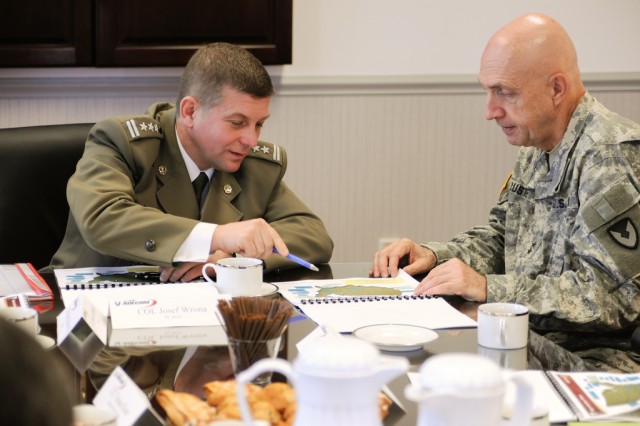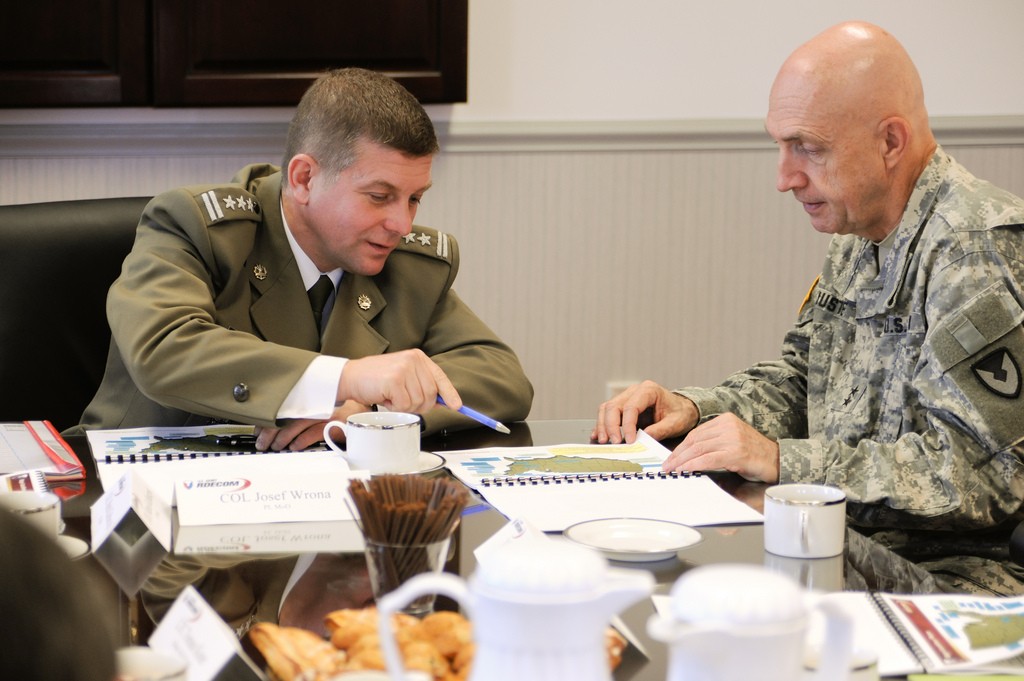
ABERDEEN PROVING GROUND, Md. -- American and Polish military officers said that a dialogue between Warfighters and scientists is vital in empowering their nation's Soldiers during a meeting Oct. 28.
Maj. Gen. Nick Justice, commanding general of APG and the U.S. Army Research, Development and Engineering Command, emphasized that engaging students, from elementary school to college, is key to developing the next generation of researchers.
"Everywhere you go, we have a very close affiliation with our university structure," Justice said. "We became the arsenal of democracy in World War II by leveraging the universities in our country. We reach down into our schools to grow [students] from the very beginning. That is a fun job."
Justice hosted three Polish officers and a senior military scientist at the RDECOM headquarters building during their week-long visit to the Washington area. The group's APG visit included tours of U.S. Army Research Laboratory and Edgewood Chemical Biological Center facilities.
They also visited the Deputy Assistant Secretary of the Army for Research and Technology and the 2010 Association of the U.S. Army annual meeting in Washington.
Justice spoke with pride about APG's growth and possibilities for technological excellence. He noted the $1 billion construction boom and the relocation of the Communications-Electronics Command and Army Test and Evaluation Command to APG.
"The three centers for the United States Army will be Fort Hood, Fort Bragg and Aberdeen Proving Ground. APG is the new one," he said. "The technology is now coalescing here."
Polish Col. Jozef Wrona is the national research and technology director for the Department of Science and Military Education in the Polish Ministry of National Defense. He and Justice discussed the challenges in leveraging the skills of the research and technology community to improve capabilities for Soldiers.
The military leaders said that research cooperation among government, the educational system and industry must become an international priority to defeat common enemies.
"We are building a Polish Ministry of National Defense R&T;strategy. What is the main mission of this strategy'" Wrona said. "The mission is to improve the effectiveness of R&T;projects through better harmonization within the discussion of Warfighters, scientists and industry."
Wrona said the Polish military is working with the North Atlantic Treaty Organization and European Defense Agency to achieve those objectives.
Justice and Wrona agreed that communication between scientists and Soldiers is important. The two groups must speak the same "language," they said.
"My problem is a common language [between scientists and Soldiers]," Wrona said. "That's very important - the language of Warfighters. Everything [scientists] do is not for them but for the fighters."
Justice said RDECOM's Field Assistance in Science and Technology teams are deployed around the world to bring scientific solutions quickly to combat zones.
"How do I bring that Soldier, in his language, close to the scientist, in his scientific language'" he said. "I need to be able to put those engineering capabilities with my Soldiers.
"If I can put them with the Warfighter and speak the language, they can understand and solve the problems. That may be the biggest thing we can do to empower, unburden and protect Soldiers. It's all about speed and delivery."

Social Sharing